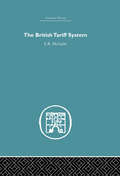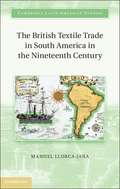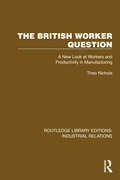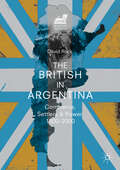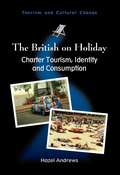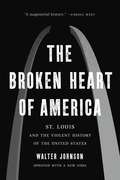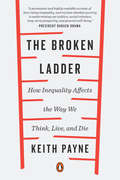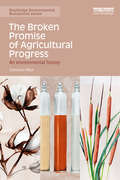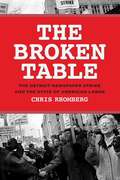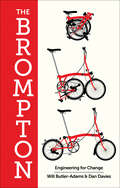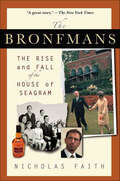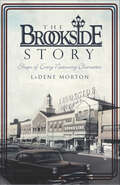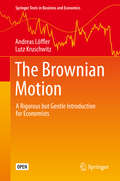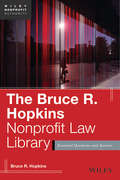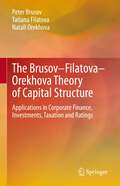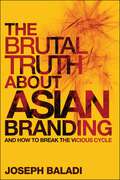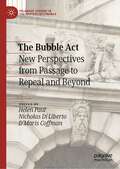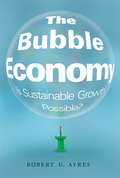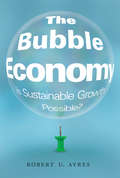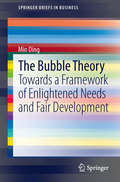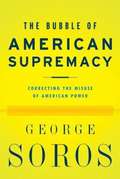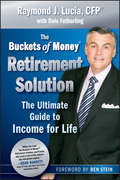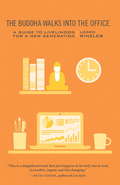- Table View
- List View
The British Tariff System (Routledge Library Editions: International Trade Policy Ser. #5)
by E.B. McGuireThis book provides a comprehensive description of the protectionist system that has for some years been in force in Great Britain. It explains in simple language the principles and difficulties involved in framing and administering a customs and excise tariff, which has both revenue and political purposes. There is a in-depth description of the United Kingdom collecting machinery, an historical account of the tariff since 1914, and a discussion of the political objects such as Imperial Preference. The problems of tariff negotiating are discussed, and trade agreements made, including that with the U.S.A., are summarized.
The British Textile Trade in South America in the Nineteenth Century
by Manuel Llorca-JañaThis is the first work on British textile exports to South America during the nineteenth century. During this period, textiles ranked among the most important manufactures traded in the world market and Britain was the foremost producer. Thanks to new data, this book demonstrates that British exports to South America were transacted at very high rates during the first decades after independence. This development was due to improvements in the packing of textiles; decreasing costs of production and introduction of free trade in Britain; falling ocean freight rates, marine insurance and import duties in South America; dramatic improvements in communications; and the introduction of better port facilities. Manuel Llorca-Jaña explores the marketing chain of textile exports to South America and sheds light on South Americans' consumer behaviour. This book contains the most comprehensive database on Anglo-South American trade during the nineteenth century and fills an important gap in the historiography.
The British Worker Question: A New Look at Workers and Productivity in Manufacturing (Routledge Library Editions: Industrial Relations)
by Theo NicholsThe British Worker Question (1986) examines the productivity of British workers, drawing upon a wide range of management, trade union and other sources, and spanning the traditional preserves of several other areas and disciplines – economic history, industrial administration, industrial relations and Marxism. It criticises much earlier research for its lack of a grounded sociological analysis of both workers and managements and for its lack of detailed attention to how goods and services are actually produced. The book accords a central place in its analysis of workers and productivity to the role of social organisation and management, matters which both the orthodox and Marxist traditions neglect.
The British in Argentina: Commerce, Settlers and Power, 1800–2000 (Britain and the World)
by David RockDrawing on largely unexplored nineteenth- and twentieth-century sources, this book offers an in-depth study of Britain’s presence in Argentina. Its subjects include the nineteenth-century rise of British trade, merchants and explorers, of investment and railways, and of British imperialism. Spanning the period from the Napoleonic Wars until the end of the twentieth century, it provides a comprehensive history of the unique British community in Argentina. Later sections examine the decline of British influence in Argentina from World War I into the early 1950s. Finally, the book traces links between British multinationals and the political breakdown in Argentina of the 1970s and early 1980s, leading into dictatorship and the Falklands War. Combining economic, social and political history, this extensive volume offers new insights into both the historical development of Argentina and of British interests overseas.
The British on Holiday
by Hazel AndrewsThis book is the only in-depth ethnographic study of British charter tourists. It is based on several months of participant observation of British charter tourists on holiday in Palmanova and Magaluf on the Mediterranean Island of Mallorca. With a focus on space, the body, and food and drink practices, the book explores the experiential nature of touristic practice which provides insight into constructions, understandings and knowledge of the self in relation to national, regional, class, and gender identities. These issues in turn highlight elements of power and control which are mainly articulated through the attempts to manipulate tourists' consumption practices by the mediators of tourists' experiences.
The Broken Heart of America: St. Louis and the Violent History of the United States
by Walter JohnsonA searing portrait of the racial dynamics that lie inescapably at the heart of our nation, told through the turbulent history of the city of St. Louis.From Lewis and Clark's 1804 expedition to the 2014 uprising in Ferguson, American history has been made in St. Louis. And as Walter Johnson shows in this searing book, the city exemplifies how imperialism, racism, and capitalism have persistently entwined to corrupt the nation's past. St. Louis was a staging post for Indian removal and imperial expansion, and its wealth grew on the backs of its poor black residents, from slavery through redlining and urban renewal. But it was once also America's most radical city, home to anti-capitalist immigrants, the Civil War's first general emancipation, and the nation's first general strike -- a legacy of resistance that endures. A blistering history of a city's rise and decline, The Broken Heart of America will forever change how we think about the United States.
The Broken Ladder: How Inequality Affects the Way We Think, Live, and Die
by Keith PayneA timely examination by a leading scientist of the physical, psychological, and moral effects of inequality. Today’s inequality is on a scale that none of us has seen in our lifetimes, yet this disparity between rich and poor has ramifications that extend far beyond mere financial means. In The Broken Ladder psychologist Keith Payne examines how inequality divides us not just economically, but has profound consequences for how we think, how our cardiovascular systems respond to stress, how our immune systems function, and how we view moral ideas like justice and fairness. Experiments in psychology, neuroscience, and behavioral economics have not only revealed important new insights on how inequality changes people in predictable ways, but have provided a corrective to our flawed way of viewing poverty as the result of individual character failings. Among modern, developed societies, economic inequality is not primarily about money, but rather about relative status: where we stand in relation to other people. Regardless of their average income, countries or states with greater levels of income inequality have much higher rates of all the social problems we associate with poverty, including lower average life expectancies, serious health issues, mental illness, and crime. The Broken Ladder explores such issues as why women in poor societies often have more children, and have them younger; why there is little trust among the working class that investing for the future will pay off; why people’s perception of their relative social status affects their political beliefs, and why growing inequality leads to greater political divisions; how poverty raises stress levels in the same way as a physical threat; inequality in the workplace, and how it affects performance; why unequal societies become more religious; and finally offers measures people can take to lessen the harm done by inequality in their own lives and the lives of their children.
The Broken Promise of Agricultural Progress: An Environmental History (Routledge Environmental Humanities)
by Cameron MuirFood and the global agricultural system has become one of the defining public concerns of the twenty-first century. Ecological disorder and inequity is at the heart of our food system. This thoughtful and confronting book tells the story of how the development of modern agriculture promised ecological and social stability but instead descended into dysfunction. Contributing to knowledge in environmental, cultural and agricultural histories, it explores how people have tried to live in the aftermath of ‘ecological imperialism’. The Broken Promise of Agricultural Progress: An environmental history journeys to the dry inland plains of Australia where European ideas and agricultural technologies clashed with a volatile and taunting country that resisted attempts to subdue and transform it for the supply of global markets. Its wide-ranging narrative puts gritty local detail in its global context to tell the story of how cultural anxieties about civilisation, population, and race, shaped agriculture in the twentieth century. It ranges from isolated experiment farms to nutrition science at the League of Nations, from local landholders to high profile moral crusaders, including an Australian apricot grower who met Franklin D. Roosevelt and almost fed the world. This book will be useful to undergraduates and postgraduates on courses examining international comparisons of nineteenth and twentieth century agriculture, and courses studying colonial development and settler societies. It will also appeal to food concerned general readers.
The Broken Table
by Chris RhombergWhen the Detroit newspaper strike was settled in December 2000, it marked the end of five years of bitter and violent dispute. No fewer than six local unions, representing 2,500 employees, struck against the Detroit News, the Detroit Free Press, and their corporate owners, charging unfair labor practices. The newspapers hired permanent replacement workers and paid millions of dollars for private security and police enforcement; the unions and their supporters took their struggle to the streets by organizing a widespread circulation and advertising boycott, conducting civil disobedience, and publishing a weekly strike newspaper. In the end, unions were forced to settle contracts on management's terms, and fired strikers received no amnesty. In The Broken Table, Chris Rhomberg sees the Detroit newspaper strike as a historic collision of two opposing forces: a system in place since the New Deal governing disputes between labor and management, and decades of increasingly aggressive corporate efforts to eliminate unions. As a consequence, one of the fundamental institutions of American labor relations—the negotiation table—has been broken, Rhomberg argues, leaving the future of the collective bargaining relationship and democratic workplace governance in question. The Broken Table uses interview and archival research to explore the historical trajectory of this breakdown, its effect on workers' economic outlook, and the possibility of restoring democratic governance to the business-labor relationship. Emerging from the New Deal, the 1935 National Labor Relations Act protected the practice of collective bargaining and workers' rights to negotiate the terms and conditions of their employment by legally recognizing union representation. This system became central to the democratic workplace, where workers and management were collective stakeholders. But efforts to erode the legal protections of the NLRA began immediately, leading to a parallel track of anti-unionism that began to gain ascendancy in the 1980s. The Broken Table shows how the tension created by these two opposing forces came to a head after a series of key labor disputes over the preceding decades culminated in the Detroit newspaper strike. Detroit union leadership charged management with unfair labor practices after employers had unilaterally limited the unions' ability to bargain over compensation and work conditions. Rhomberg argues that, in the face of management claims of absolute authority, the strike was an attempt by unions to defend workers' rights and the institution of collective bargaining, and to stem the rising tide of post-1980s anti-unionism. In an era when the incidence of strikes in the United States has been drastically reduced, the 1995 Detroit newspaper strike stands out as one of the largest and longest work stoppages in the past two decades. A riveting read full of sharp analysis, The Broken Table revisits the Detroit case in order to show the ways this strike signaled the new terrain in labor-management conflict. The book raises broader questions of workplace governance and accountability that affect us all.
The Brompton: Engineering For Change
by Dan Davies William Butler-AdamsThe story of how Brompton, the iconic folding bicycle that you can take anywhere—and that can take you anywhere—grew from a small cult bike company to a multimillion-dollar business Lightweight, compact, distinctively styled, and now, electric: The Brompton isn’t the only folding bicycle—or even the first. But everyone who has been on one will enthusiastically testify to its marvelous design (virtually unchanged over decades) and the particular joy of riding it. Will Butler-Adams, CEO of Brompton Bicycles, has been at the company for twenty years. Initially, he worked as an engineer for Andrew Ritchie, the bike’s brilliant inventor and the business’s founder, before taking the helm in 2008. Butler-Adams’s heartfelt mission is to grow and promote sustainable urban transportation and to improve city-dwellers’ lives everywhere. Under his leadership, Brompton has grown from making a few hundred bikes a year to over 90,000, with revenue of $130 million. But progress hasn’t always been easy: There have been boardroom struggles, supply-chain problems, and conflicts with founder Andrew Ritchie. In The Brompton, Butler-Adams brings to life what it means to grow a company to global scale. He also tells the stories of the people who make the Brompton and the people who ride it. And he explains how customers all around the world fell in love with a brand that never set out to be a brand.
The Bronfman Dynasty; the Rothschilds of the New World
by Peter C. NewmanThe Bronfman family is a Canadian Jewish family who made a fortune with the family's Seagram Company.
The Bronfmans: The Rise and Fall of the House of Seagram
by Nicholas FaithFor decades, the Bronfman family ruled Seagram's and the liquor industry. This is the story of their meteoric rise and spectacular fall.The story of the Bronfman family is a fascinating and improbable saga. It is dominated by "Mr. Sam," the single greatest figure in the history of the liquor business, the man who made drinking whiskey respectable in the United States and who in the 1950s and 1960s built Seagram into the first worldwide empire in wine and spirits.After Sam's death in 1971, his oldest son, Edgar, maintained the business, though he was distracted by his matrimonial problems. Nevertheless, in the 1980s he masterminded a major coup when he translated a small investment in oil made by his father into a 25 percent stake in the mighty DuPont company. But in the 1990s, Edgar allowed his second son, Edgar Jr., to indulge his ambition to become a media tycoon. The stake in DuPont was sold, and the money reinvested in Universal, the film and theme-park empire. Edgar Jr. then paid more than $10 billion to buy Polygram Records and thus fulfill his fancy to be king of the world's music business. But at the same time, he remained in charge of the liquor business, which started to stagnate—indeed, to fall apart. Then came the final disaster when the increasingly divided family sold out to Jean-Marie Messier, overreaching empire builder of Vivendi, the French conglomerate. But the story of this amazing family over the past century is about more than booze and business. The Bronfmans is a spectacular account that details the larger-than-life personalities and bitter rivalries that have made the family so famous and, sometimes, so infamous.
The Bronx Community Foundation
by Aldo Sesia Brian TrelstadDerrick and Desmon Lewis were both successful professionals in the consulting and banking industries. They were born and raised in The Bronx, New York City's poorest borough. The Lewis brothers had always wanted to give back to the community. In 2016 they launched a community foundation-The Bronx Community Foundation-dedicated to improving the lives of Bronxites. While a lot of good had been happening in The Bronx, Derrick and Desmon believed that a community foundation would help to bring the systemic and institutional change to the borough; change they felt was necessary to bring economic, health, educational, etc., equality to The Bronx. Yet, nearly four years later, they had managed to raise little from donors; headwinds included those in the community who did not support the idea of a community foundation. When COVID-19 struck New York City in March 2020, the Lewises saw an opportunity to demonstrate the need for a place-based convener organization, such as a community foundation, in The Bronx. A relief effort was launched with a host of partners, which raised $10 million to help people of The Bronx who were impacted by COVID-19. Now in late July, the Lewises wanted to build on the momentum of the relief fund to finally get support and traction for the community foundation. They had much to decide: How to raise money for the foundation, which would need to come primarily from outside of the borough; who should lead the foundation; and what should be the foundation's operating model. The Lewises believed there was a window of opportunity that they needed to seize to turn their dream of a community foundation for The Bronx into a reality. The case provides an overview of community foundations in the U.S., an overview of The Bronx, The Bronx Community Relief Effort, and the Lewis brothers' early days and their efforts to start a community foundation, the opportunity, and the challenges.
The Brookside Story: Shops of Every Necessary Character (Brief History)
by LaDene MortonBrookside's burgundy-and-blue-striped awnings represent both a quaint corner of Kansas City where you can tread the creaky wooden floors of the Dime Store and a pragmatic philosophy that changed the way America planned its cities. Renowned developer J.C. Nichols's "plan for permanence" was built on his conviction that if a community could offer its residents everything they would want and need, build to high standards and plan for future growth, the community would last. The Brookside shopping district has been giving the community everything it could want and need since 1919, helping it weather economic turbulence, natural disasters and dramatic changes.
The Brownian Motion: A Rigorous but Gentle Introduction for Economists (Springer Texts in Business and Economics)
by Andreas Löffler Lutz KruschwitzThis open access textbook is the first to provide Business and Economics Ph.D. students with a precise and intuitive introduction to the formal backgrounds of modern financial theory. It explains Brownian motion, random processes, measures, and Lebesgue integrals intuitively, but without sacrificing the necessary mathematical formalism, making them accessible for readers with little or no previous knowledge of the field. It also includes mathematical definitions and the hidden stories behind the terms discussing why the theories are presented in specific ways.
The Bruce R. Hopkins Nonprofit Law Library
by Bruce R. HopkinsNeed a quick answer to a nonprofit legal conundrum? It's literally at your fingertips with The Bruce R. Hopkins Nonprofit Law Library. Supplying you with find-it-on-the-run answers to your nonprofit law questions, this Library prepares you to meet and manage your nonprofit's legal obligations with its step-by-step guidance. Packed with authoritative answers to the most essential questions on how to start a nonprofit organization; nonprofit law basics; maintenance of tax exemption; public charity rules; unrelated business rules; boards of directors and compensation; conflicts of interest; self-dealing; liability, and much more, this e-Library offers hands-on information mined from the following bestselling books and updated and expanded by the leading authority on nonprofit law, Bruce R. Hopkins:* Nonprofit Law for Religious Organizations: Essential Questions & Answers / Bruce R. Hopkins and David Middlebrook* 650 Essential Nonprofit Law Questions Answered / Bruce R. Hopkins* The Legal Answer Book for Private Foundations / Bruce R. Hopkins and Jody Blazek* Starting and Managing a Nonprofit Organization, Sixth Edition / Bruce R. Hopkins* Nonprofit Law for Colleges and Universities / Bruce R. Hopkins, Virginia C. Gross, and Thomas J. SchenkelbergFrom acquiring and maintaining tax-exempt status to fundraising regulation, The Bruce R. Hopkins Nonprofit Law Library gives you the legal guidance and practical insights you need--now.
The Brusov–Filatova–Orekhova Theory of Capital Structure: Applications in Corporate Finance, Investments, Taxation and Ratings
by Peter Brusov Tatiana Filatova Natali OrekhovaThe book introduces and discusses the modern theory of the cost of capital and capital structure - the BFO theory (Brusov-Filatova-Orekhova theory), which is valid for companies of arbitrary age and which replaced the theory of Nobel laureates Modigliani and Miller. The theory takes into account the conditions faced by companies operating in the real economy, such as revenue fluctuations; the arbitrary frequency of tax on profit payments (monthly, quarterly, semi-annual or annual payments), both for advance income tax payments and for payments at the end of the respective period; and the arbitrary frequency of interest on loans payments. The impact of these conditions on the company value, on the cost of raising capital, on the company's dividend policy and managerial decisions are discussed. The book subsequently develops new applications of the BFO theory in several areas such as corporate finance, corporate governance, investments, taxation, business valuations and ratings.
The Brutal Truth About Asian Branding
by Joseph BaladiThis is one of the most thoughtful books on branding I've come across. Most such books are either quickly-crafted "how-to" books or academic tomes over-burdened with references. This book is thoughtful because it raises questions which deal with the "why" rather than just "how" of branding. The reference to brutal truth as the truth which will set us free-to examine ourselves without self-illusions-is liberating. The notion that Asia has many good, but no great brands, is also not a put-down but a clarion call for Asian CEOs to rise to the challenge and create lasting, meaningful, committed brands. Ho Kwon Ping Chairman/CEO, Banyan Tree and Board of Trustees, SMU 2010 recipient of the "Lifetime Achievement Award" by the American Creativity Association A cold shower to wake people up. Joe Baladi's Brand Blueprint is a great tool for anyone involved in Sovereign Relationship Marketing or brand building anywhere. Timothy Love Vice Chairman Chief Executive Officer, Omnicom APIMA There are many books about branding but few address Asian companies directly. Joe Baladi has been one of the loudest voices to advocate strong branding practices to Asian companies determined to outperform their competitors. The Brutal Truth About Asian Branding is a timely book that all Asian CEOs with global aspirations should read. Richard Eu Group CEO, Eu Yan Sang International The Brutal Truth About Asian Branding is the first book that connects branding frameworks to the realities of operating in Asia. It offers a very straightforward perspective on the challenges Asian CEOs face as they build their businesses and their brands, and perhaps the most compelling part of the book is the passionate plea for how Asian CEOs should be thinking different about branding. In true Baladi style, it is straight from the heart. Maarten Kelder Managing Partner (Asia), Monitor Group A very interesting and valuable perspective on Asian branding. . . one that decision makers in the region should read and embrace. Well done Joe! Ron Sim Founder & CEO, OSIM International Brands mean Business, anywhere in the world! The focus on Asia, at this time, is natural since the developing nations of the region did so much to help the world recover from the global 2008 economic crisis. Baladi's text is timely; it is thoughtful and thought-provoking; putting people and brands center stage with practical insights borne of his breadth of personal experience at the frontline. Chris D. Beaumont Professor, Tokyo University, Global Centre of Excellence Director, North Asia, Results International The brutal truth is that Joe Baladi is right. Asian CEOs must learn the brand skills used so successfully in the rest of the world. It will take a big change in mentality, but the rewards will be vast. This book is a great start to that revolution. Michael Newman Author, 22 Irrefutable Laws of Advertising
The Bubble Act: New Perspectives from Passage to Repeal and Beyond (Palgrave Studies in the History of Finance)
by D’Maris Coffman Helen Paul Nicholas Di LibertoThis book reassesses the actual effects of the Bubble Act, still popularly associated with the bursting of the South Sea Bubble. The book builds on the foundational work of Ron Harris to discuss the act’s effect on corporate governance, literary culture, colonial law, and the Industrial Revolution. The Bubble Act was deemed an empty letter within England itself as it was rarely used in legal proceedings. Several chapters consider whether this was the case outside England, from Scotland to the Americas, India, and Africa. Others assess the impact of the act, both on literary culture and in the history of economic thought. The act has been conceptualized as a brake on economic development or of little consequence. This edited collection offers a timely reassessment of the Bubble Act and its legacy.
The Bubble Economy: Is Sustainable Growth Possible?
by Robert U. AyresWhy the global economy has become increasingly unstable, and how financial "de-carbonization" could break the pattern of bubble-driven wealth destruction.
The Bubble Economy: Is Sustainable Growth Possible? (The\mit Press Ser.)
by Robert U. AyresWhy the global economy has become increasingly unstable, and how financial “de-carbonization” could break the pattern of bubble-driven wealth destruction.The global economy has become increasingly, perhaps chronically, unstable. Since 2008, we have heard about the housing bubble, subprime mortgages, banks “too big to fail,” financial regulation (or the lack of it), and the European debt crisis. Wall Street has discovered that it is more profitable to make money from other people's money than by investing in the real economy, which has limited access to capital—resulting in slow growth and rising inequality. What we haven't heard much about is the role of natural resources—energy in particular—as drivers of economic growth, or the connection of “global warming” to the economic crisis. In The Bubble Economy, Robert Ayres—an economist and physicist—connects economic instability to the economics of energy.Ayres describes, among other things, the roots of our bubble economy (including the divergent influences of Senator Carter Glass—of the Glass-Steagall Law—and Ayn Rand); the role of energy in the economy, from the “oil shocks” of 1971 and 1981 through the Iraq wars; the early history of bubbles and busts; the end of Glass-Steagall; climate change; and the failures of austerity.Finally, Ayres offers a new approach to trigger economic growth. The rising price of fossil fuels (notwithstanding “fracking”) suggests that renewable energy will become increasingly profitable. Ayres argues that government should redirect private savings and global finance away from home ownership and toward “de-carbonization”—investment in renewables and efficiency. Large-scale investment in sustainability will achieve a trifecta: lowering greenhouse gas emissions, stimulating innovation-based economic growth and employment, and offering long-term investment opportunities that do not depend on risky gambling strategies with derivatives.
The Bubble Theory: Towards a Framework of Enlightened Needs and Fair Development
by Min DingThe term sustainable development (SD) has now become a ubiquitous idea, philosophy, and guiding principle in our society. Governments, business, NGOs and individuals have embraced the mindset, and even the education institutions talk about graduating young people with sustainability in their DNA. Despite its noble origin, however, sustainable development is a concept that embodies compromise. This compromise has led to a term that is devoid of scientific foundation and actionable guidelines. In this volume, Min Ding offers an alternative to SD, introducing a framework, which he calls the Bubble Theory, built on three layers: the symbiotic duo (subconscious desires at the self and species levels); enlightened needs (manifested desires of the self and species beyond basic survival and procreation), and human development principles (with fair development as the ideal principle for the present). These fundamental concepts of enlightened needs (EN) and fair development (FD) have profound implications for both the theory and application of new practices in business and policymaking.
The Bubble of American Supremacy
by George SorosIn an effort to closely examine the American foreign policy in the wake of the September 11, 2001 attack, George Sorows describes the climb to power of the American Supremacist group in the Bush cabinet. These group of radical extremists have redefined the American Foreign policy to base it on power in stead of demoratic principles. Sorows argues to redefine the policy by multilateral actions and better economic policies to avert a potential disaster. Sorows provides historical analysis, describes the current state of affairs and presents solutions to the upcoming challenge.
The Buckets Of Money Retirement Solution
by Ben Stein Lucia Raymond J.Investors, shell-shocked by the "Great Recession" of 2008-2009, are looking for answers, for something fresher than the old 'buy-and-hold' mantra. They hunger for stability, yet yearn for growth to rejuvenate their battered portfolios. Ray Lucia's The Buckets of Money Retirement Solution: The Ultimate Guide to Income for Life provides just that-a reassuring and scientifically proven strategy that gives investors both growth and income. Lucia, a Certified Financial Planner who's helped thousands of people invest more than $2 billion, explains how to spend down 'safe' buckets (containing, for example, Treasuries, CDs, bonds), while leaving a riskier bucket (real estate, stocks and alternative investments) to grow long-term. This strategy shields investors from the short-term ups and downs of the market. And it gives them the courage and discipline to stay invested no matter what the future holds. Written in a breezy, accessible style and loaded with tons of examples and clear, specific calculations, the book explains how to set your financial goals, divvy up your money accordingly, and then invest intelligently. With this book as your guide, readers will learn how to achieve both income and growth while at the same time reducing risk. "All in all," Lucia writes, "this plan is akin to a sports car that seats six, approximating the best of both worlds. In this case by being a conservative strategy that's also growth-oriented. " Almost every kind of investment-stocks, bonds, commodities, real estate-plunged in the past year or two, turning off millions of investors who'd been planning for and counting on a reasonably comfortable retirement. These retirees or near-retirees need solutions . . . something fresher than the old 'buy-and-hold' mantra. Yet here's what they hear from the financial-services industry: Set up an asset-allocation model, then take a systematic withdrawal to support your retirement . . . remembering, of course, to rebalance the accounts to remain in sync with the model. Wrong! That maximizes the advisors' fees but doesn't protect the investors' assets during the tough times.
The Buddha Walks into the Office
by Lodro RinzlerFrom the author of the best-selling Buddha Walks into a Bar . . . , wisdom for "Generation Next" on how to make your work meaningful, satisfying, and of benefit to others. Does it ever seem that a lot of the people you work with are, well, jerks? This book is about how not to let work turn you into one of them. Apply the simple Buddhist teachings and practices Lodro Rinzler provides here to whatever you do for a living, and you'll not only avoid jerk-hood, but you'll be setting out on the path toward making your livelihood an expression of your inherent wisdom, honesty, and compassion. You'll discover practical ways to bring mindfulness into administrative support, cabinet-making, financial management, nursing, truck-driving, or latté-brewing. In the process, you'll discover genuine empathy for the folks you once found so difficult. You'll also learn leadership skills that apply compassion to management in a way that increases happiness along with efficiency. This is career advice of the profoundest kind, geared toward today's twenty- and thirty-something workers and job-seekers whose employment outlook is radically different from that of a generation ago. As Lodro shows, even if the path of work shifts beneath your feet, it's possible to make your livelihood a source of satisfaction and of deep meaning.
